
Edward Winter

CHESS, November 1970, page 67
‘A reporter said that he nearly fell asleep at a chess tournament. Better luck next time.’
D.J. Morgan, BCM, December 1970, page 362
Did a world champion once drop off to sleep whilst defending his title? Yes, according to an article by Thomas Olsen, ‘Capablanca – and Some Others’ in CHESS, 14 November 1938. From page 86:
‘At Buenos Aires, Alekhine triumphed in a contest of long and tiring games, during one of which Capablanca, apparently or actually, fell asleep at the board waiting for Alekhine to move and had to be awakened by the officials.’
Not a likely story, even with the escape clause ‘apparently or actually’. If only ‘apparently’, there would have been no awakening.
(824)
From C.D. Robinson (Toronto, Canada):
‘No, Capablanca did not fall asleep during a game of the 1927 world championship match. The circumstances of the 16th game were the reverse of soporific according to Alekhine’s account in Auf dem Wege zur Weltmeisterschaft (Berlin and Leipzig, 1932).’
We quote from page 178 of the English edition, On the Road to the World Championship 1923-1927 (Oxford, 1984):
‘My decision to agree a draw so early is explained only by the quite unusual circumstances in which this game took place. In fact, we were playing in the Jockey Club, not the usual venue, and it was so noisy there that we were forced to adjourn at move 24, i.e. even before the time control, in order to allow time for things to calm down. Later on, however, I was no longer in the mood for deep thought, and the game was agreed drawn without further ado.
Incidentally, the above lines may serve to show that the report that my opponent “fell asleep” during this game was nothing more than the invention of some witty newspaper man.’
(861)
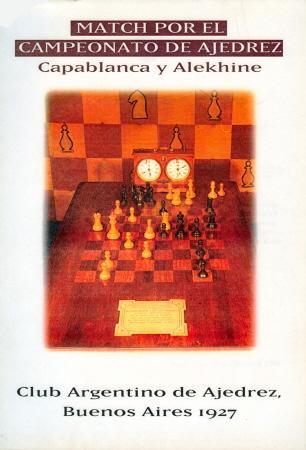
A very rare book published in Buenos Aires in 1994, Match por el campeonato de ajedrez Capablanca y Alekhine, reproduces about two dozen letters and telegrams exchanged by the two masters and the organizers, and an item of particular interest is a letter written on 18 October 1927 by Alekhine, in French, on stationery of the Majestic Hotel, Buenos Aires. The recipient was the President of the Club Argentino de Ajedrez, Lizardo Molina Carranza, to whom Alekhine complained of having read in the morning’s newspapers that game 17 would be played at the Jockey Club. Refusing to accept this, Alekhine commented that the previous day game 16 had been played there under conditions contrary to the spirit and letter of the match rules. In view of the unbearable noise in adjoining rooms, Capablanca had been obliged to stop his clock, thereby breaking off the game (an occurrence ‘probably unique in the annals of the world championship’). Finding mental effort impossible in such circumstances, Alekhine had accepted Capablanca’s draw offer despite having the better position.
The two key paragraphs in Alekhine’s letter are given below, with some corrected spelling:
‘A. Mon adversaire, vu le bruit insupportable qui régnait dans les pièces adjacentes à celle où se jouait la partie, se vit obligé à arrêter la pendule, suspendant ainsi de propio avisu [sic] le jeu, chose probablement unique dans les annales des championnats du Monde.
B. Moi-même ne vis d’autre solution pour sortir de cette atmosphère hostile à tout travail mental, que d’accepter la nullité proposée par mon adversaire, dans une position que je considérais avantageuse pour moi et qui, en tout cas, aurait pu donner lieu à une lutte sérieuse et prolongée.’
Regarding the story that Capablanca fell asleep during game 16, page 44 of Le match Capablanca Alekhine (Brussels, 1929) V. Soultanbéieff commented that, according to the United Press, this had occurred while Alekhine was reflecting on his 19th move and that Capablanca was not awoken by the match director until it was his move. A footnote on the same page stated that Alekhine had denied the sensational story.
From page 78 of Portraits and Reflections by Stuart Hodgson (London and New York, 1929), a book discussed in C.N. 8889:
‘Alekhine won. The Invincible was beaten. Exactly why it happened has not been really explained. But I suspect light is thrown upon it by an incident which occurred during the long gruelling contest. The unfeeling world roared with laughter when it was learnt that during one of Alekhine’s long meditations Capablanca had fallen asleep and had to be awoken forcibly when his turn came. But any man who has ever played even one hard-fought four-hour chess match will not be much disposed to laugh at that incident.’
A quote from page 48 of Michael Adams Development of a Grandmaster by Bill and Michael Adams (Oxford, 1991), in which the master’s father describes an incident at the East Devon Open in 1983:
‘... I was aware of a large crowd around Michael's board after about three hours of play. I did not go across and it was only later that I found out that Michael had fallen asleep at the board. Nobody knew what to do because it was felt that if I was asked to wake him up, it would constitute receiving help from a third party, which would be against the laws of chess. As it happened, Michael stirred after a quarter hour or so and proceeded to play a move as if nothing had happened.’
(Kingpin, 1993)
From page 457 of the September 1937 BCM comes a report on round 15 of that year’s Stockholm Olympiad:
‘Landau, tired out with hard play and journalistic work combined, fell asleep at the 11th move. Sympathetically realizing the situation, Dunkelblum shook him gently by the arm and suggested a draw. “Yes”, said Landau, “and please don't wake me again”.’
(Kingpin, 1998)
Harry Golombek wrote similarly on page 17 of CHESS, 14 September 1937:
‘Landau fell practically asleep at the board whilst playing Dunkelblum. Dunkelblum leaned over, after playing his 11th move, and offered a draw. “Very well”, replied Landau drowsily, “but don’t disturb me again.”’
H.N. Pillsbury in the St Louis Post-Dispatch, 1 January 1899, page [17]):
‘Before entering a tournament I make it a point to take a good, long sleep, but that is my only form of preparation.’
For the complete feature including this remark, see Harry Nelson Pillsbury.
Page 229 of Kings, Commoners and Knaves (another item that we originally gave in Kingpin, in 1995) referred to Alekhine’s alleged description of a dream in which chess masters were banned from Heaven but Bogoljubow gained entry because ‘he only thinks he’s a master’. See, for instance, pages 21-22 of The Bright Side of Chess by Irving Chernev (Philadelphia, 1948). We pointed out that the same yarn had appeared on page 6 of the July 1898 American Chess Magazine, and that item is reproduced below:
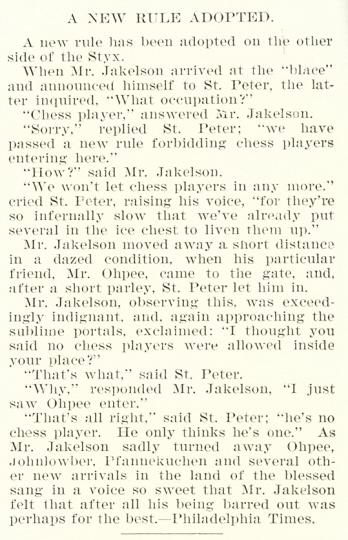
When were Alekhine and Bogoljubow introduced into the story?
(5600)
An avoid-at-all-costs book is Chess Stories Through the Ages by Donald L. Boone (Lexington, 2010). For a sample snippet we cull from page 34 this ‘once’ anecdote concerning ‘Alehkine’ and ‘Bofolubov’:
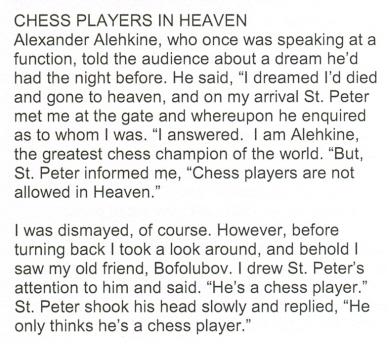
Noting that the story had appeared on page 6 of the July 1898 American Chess Magazine, C.N. 5600 asked when Alekhine and Bogoljubow were introduced into it. The earliest instance we can offer now is in an article ‘Humour and Chess’ by J. du Mont on page 133 of the May 1941 BCM:
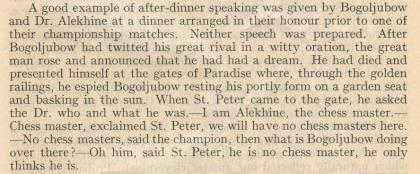
(6813)
A ‘once’ yarn from a column by Al Horowitz on page 8 of the September 1948 Chess Review:
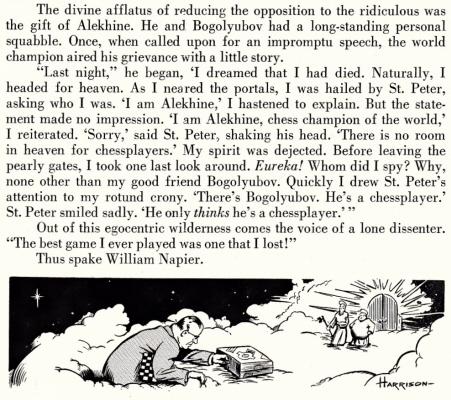
Horowitz also considered that the story, worded differently, merited a full page (page 134) in his book The New York Times Guide to Good Chess (New York, 1969).
(8672)
C.N. 9432 gave the following, from page 114 of CHESS, 14 December 1937:
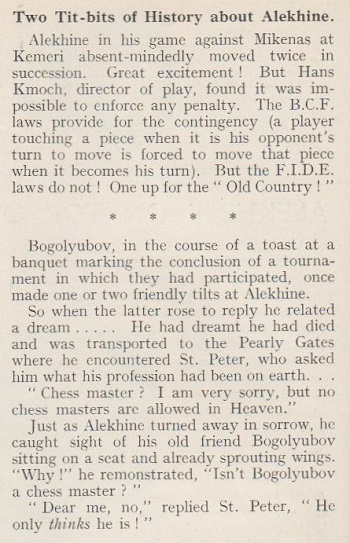
C.N. 4421 referred to an essay ‘Capa, hijo de Caissa’ by the Cuban-born writer Guillermo Cabrera Infante (1929-2005) on pages 211-234 of Vidas para leerlas (Madrid, 1998). Previously, the text had appeared on pages 406-422 of his anthology Mea Cuba (Barcelona, 1992). An English translation of the book, under the same title, was published by Faber and Faber in 1994, with a paperback edition the following year.
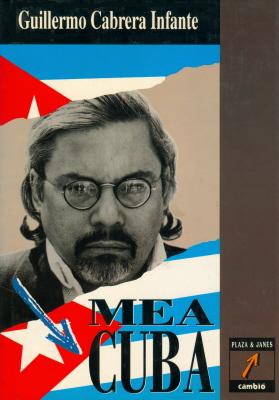
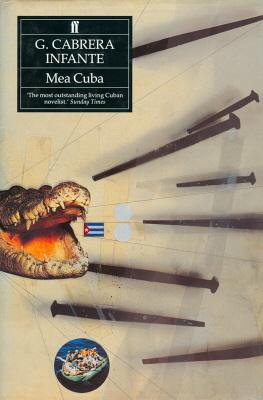
Cabrera Infante was unfamiliar with basic facts about Capablanca’s life, and one passage seems particularly odd. From pages 421-422 of the translation (by Kenneth Hall, in conjunction with the author):
‘In the Manhattan Chess Club the Cuban grew close to one of the greatest American players, Frank Marshall, whom he would defeat decisively in 1909. Capablanca was 21 [sic] years old, Marshall 33 [sic]. A very bored Capablanca playing against Marshall nodded off more than once. With a sense of humour often absent from across the chessboard, Marshall tells: “I made the worst move of the game. I woke up Capablanca.” Capablanca proceeded to execute a reveille checkmate.’
The original text was on page 409 of the 1992 Spanish volume:
‘En el club de Ajedrez de Manhattan, Capablanca intimó con uno de los grandes jugadores americanos, Frank Marshall, a quien derrotaría decisivamente en 1909. Capablanca tenía 21 años, Marshall 33. Marshall relata la ocasión en que un muy aburrido Capablanca, jugando en su contra, cabeceó más de una vez. Con un sentido del humor muchas veces ausente del tablero, contó Marshall: “Cometí el peor movimiento del juego: desperté a Capablanca.” Capa ejecutó un jaque mate fulminante.’
What are the origins of this yarn, which are reminiscent of the untrue story about Capablanca falling asleep during a match-game against Alekhine in 1927 (C.N. 5118)? Certainly, though, the Capablanca v Marshall match dragged on, and we pointed out on page 18 of our monograph on the Cuban that the 1927 world title match lasted only eight days longer. The cartoon below appeared on page 33 of the Chess Weekly, 26 June 1909:
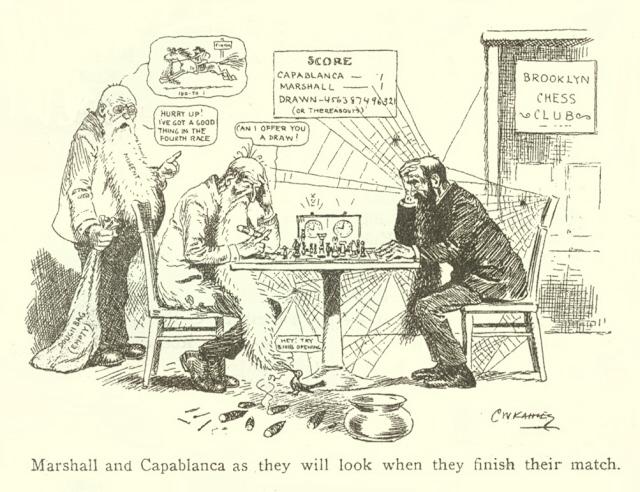
Taylor Kingston (Shelburne, VT, USA) writes:
‘Guillermo Cabrera Infante’s account of Capablanca supposedly falling asleep while playing Marshall in 1909 bears a great resemblance to an incident involving Fischer and Bisguier. One account is on page 197 of The Even More Complete Chess Addict by M. Fox and R. James (London, 1993):
“It’s New York 1963, the last round of the American championship. Bisguier and Fischer are equal first. Fischer doesn’t make a move for a long time. Bisguier looks up and sees his opponent is fast asleep. In another half-hour, the great Bobby’s clock will fall, making Bisguier the champ. That’s where we come to the most gracious blunder of all. In Bisguier’s words: ‘I made a bad move. I woke up Bobby Fischer.’ And of course Bobby, after a couple of yawns, went on to collect his fifth US title.”
This is almost identical to what Cabrera Infante reports that Marshall said (“I made the worst move of the game. I woke up Capablanca”). Could he have confused Capablanca-Marshall with Fischer-Bisguier?
Whether he did or not, there is already ample confusion about if and when Fischer may have fallen asleep while playing Bisguier. Contemporary reports on the game which was referred to by Fox and James, and was played in the last round of the US Championship in New York on 3 January 1963, mention no such incident (see, for example, Chess Life, January 1963, page 3; Chess Review, February 1963, page 63 and March 1963, pages 76-77).
Frank Brady’s Profile of a Prodigy (New York, 1973) is unsure, but indicates that it was more likely in the Western Open at Bay City, Michigan, in July 1963. Page 70 describes Fischer playing an all-night set of high-stakes blitz games and then states:
“The next morning, Fischer faced Bisguier, and though perhaps apocryphal, it has been said that he was so tired he actually fell asleep at the board and had to be awakened. It didn’t affect his play, however, as he defeated Bisguier soundly.”
Bisguier himself, though, places the incident at the New York State Open, held in Poughkeepsie, NY in August-September 1963, on page 69 of The Art of Bisguier, Selected Games 1961-2003 (Milford, 2008):
“Paired against Bobby in the New York State Open that year, I noticed that he was taking a long time to move. Then I saw that he’d fallen sound asleep. In a few minutes the flag on his clock would fall, and he’d lose on time. That’s not the way I like to win games, tourneys or titles. So I made what some called my biggest blunder of the tournament. I awakened Fischer. Bobby yawned, made a move, punched his clock and proceeded to beat me. It ended up as Game 45 in his My 60 Memorable Games. Later I heard that Fischer had stayed up late the previous night playing speed chess for money.”
Brady seems to have confused the Michigan and New York tournaments. Whether Cabrera Infante has confused Fischer with Capablanca, I cannot say, but the two accounts are remarkably similar.’
We note that a) the above-quoted text by Messrs Fox and James also appeared on page 149 of The Complete Chess Addict (London, 1987) and b) the Fox/James book was referred to, in another context, in Cabrera Infante’s ill-informed essay on Capablanca. Indeed, he clearly used it for a number of his ‘facts’.
From pages 291-292 of the July 1987 BCM, in ‘My Meetings with Alekhine’, which was a translation of ‘an article by L. Lyubimov in Shakhmaty v SSSR, 1957, pages 248-249’:
‘“Is it true that Capablanca actually slept during play?”, asked Ye. Znosko-Borovsky, who was interviewing Alekhine.
“No, never”, was the reply, “and I cannot understand where this tale came from. There was one occasion when I was thinking and Capablanca was walking about the room that he took a seat some distance away, but as soon as I made my move he came back straight away and the game continued normally. Conditions of play left nothing to be desired. We were placed in a room which was separated from the public, who could watch the play through glass doors. Later on the public was even removed from there, as the noise from them began to disturb Capablanca.”’
(10118)
Regarding Capablanca, there is another yarn to be added. From page 3 of the Linlithgowshire Gazette, 6 September 1912:
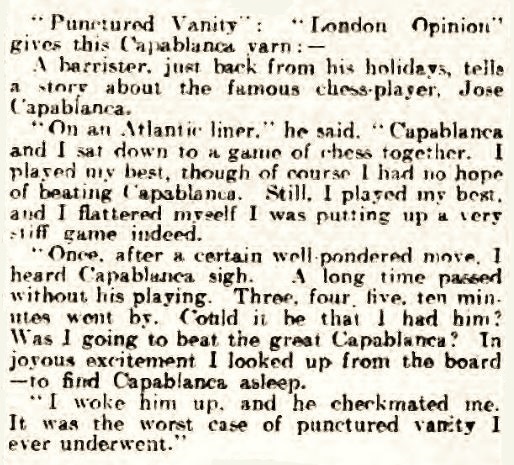
The item also appeared the same day on page 8 of the Western Daily Mercury. Can its publication in the London Opinion be traced?
Another sighting, from page 6 of the 17 October 1912 issue of the Eagle:
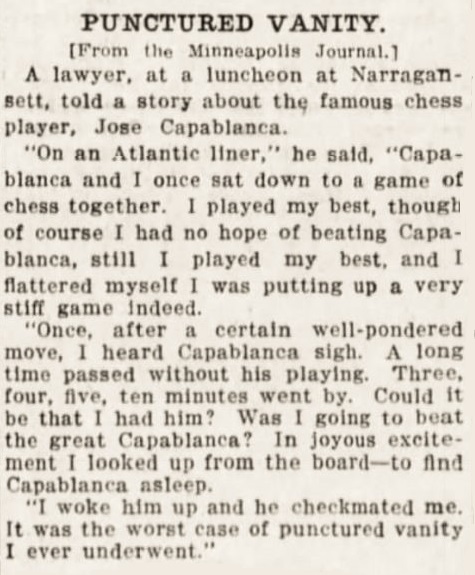
(10462)
The best and most detailed interview with Bent Larsen that we have seen was presented by C.H.O’D. Alexander on pages 86-94 of A Book of Chess (London, 1973) under the heading ‘Profile of a Grandmaster’. It took place shortly before the last round of Hastings, 1972-73. One brief passage:
‘Bronstein has influenced me – maybe Keres, but not so much; I like Keres’ book but I do not admire Keres as a chess artist. Keres is not an artist, he is a practical player. As a young player he was practical in a different way; his brilliancies were all rather conventional. I doubt that he has ever tried to be an artist and if he has he gave it up in the Second World War – and also gave up the hope of becoming world champion. I mean the following: Keres said to me once: “Sometimes I sit for 20 minutes and I know that some spectators are thinking that now there is something very deep coming: you know what’s happening? I can’t find any ideas and I am taking a nap – except for snoring and closing my eyes.” A player like Bronstein would never do that; he would be trying all the time.’
(6764)
Images from the Berne, 1932 tournament book reproduced in C.N. 8061 included the following:
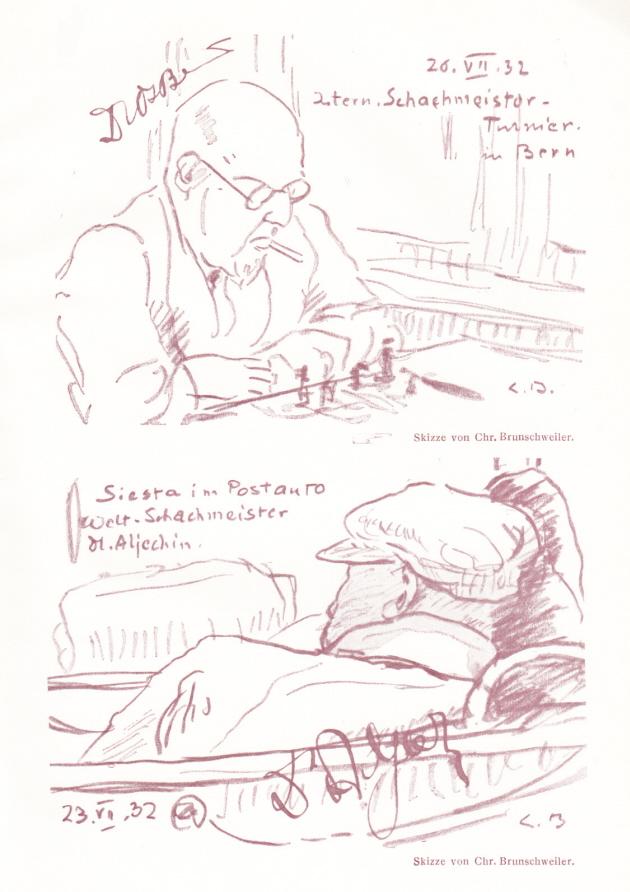
On page 13 of the January 1970 Chess Life & Review, in an article ‘Portrait of a World Champion’ by Leonard Barden, one of the exchanges with Spassky was:
‘Do you dream about chess?’
‘Only once. I was ill at the time. I caught a cold after a game with Averbakh in 1959 and in my fever dreamt I saw an enormous rook in front of me. This rook went from QR1 to QB1; it looked huge and terrible. But I have never dreamed up a complete game as Bronstein has done.’
The Bronstein game was published by J.S. Battell on page 225 of the August 1961 Chess Review:
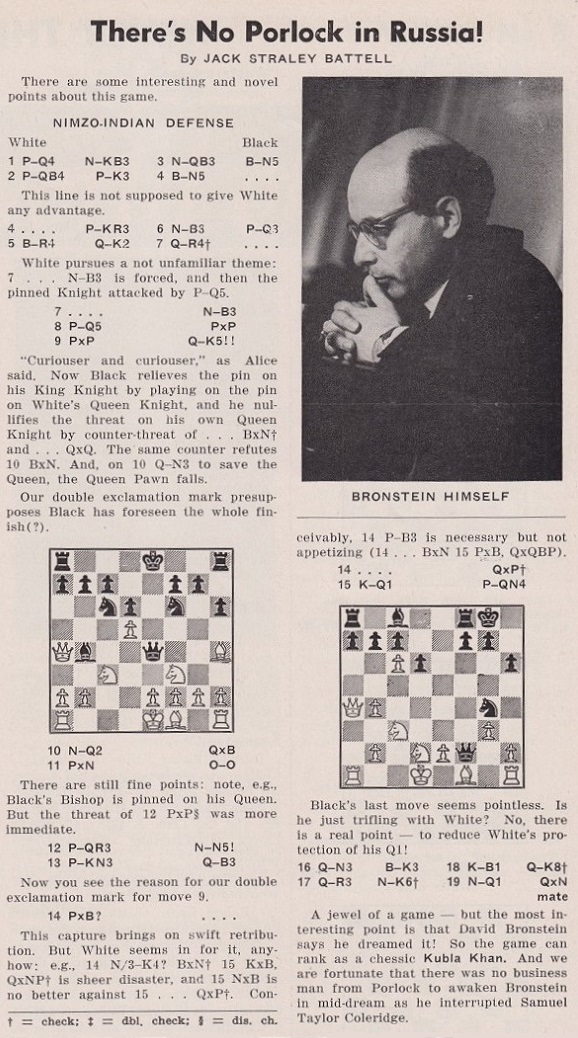
Wanted: more details about the game. It has become well known and was given (Bronstein v Bronstein, Moscow 1961) on page 142 of Wonders and Curiosities of Chess by Irving Chernev (New York, 1974).
Roland Kensdale (Aberdeen, Scotland) quotes from page 109 of The Sorcerer’s Apprentice by D. Bronstein and T. Fürstenberg (London, 1995) and page 117 of the revised edition (Alkmaar, 2009). A game between Bronstein and Boleslavsky, Moscow, 1950 began 1 d4 Nf6 2 c4 e6 3 Nc3 Bb4 4 Nf3 d6 5 Qb3, and at this point Bronstein wrote:
‘Many years ago, I think in 1960, during the Soviet Championship in Leningrad, I was thinking about my opening in the next game with Korchnoi. As he often played 1 c4 Nf6 2 Nf3 e6 3 Nc3 I decided to try 3...Bb4 and if 4 d4 then 4...d6. Then, using my fantasy, I was dreaming of a nice combination after 5 Bg5 h6 6 Bh4 Qe7! 7 Qa4+? Nc6 8 d5 exd5 9 cxd5 Qe4 10 Nd2 Qxh4 11 dxc6 O-O 12 a3 Ng4 13 g3 Qf6 14 axb4 Qxf2+ 15 Kd1 b5 16 Qb3 Be6 17 Qa3 Ne3+ 18 Kc1 Qe1+ 19 Nd1 Qxd1 mate.
After the tournament I gave a lecture in the Chigorin Chess Club and told the audience about this and used the expression “chess dream”. Later I read in a book that I saw this variation during my sleep!’
From page 287 of CHESS, June 1961:
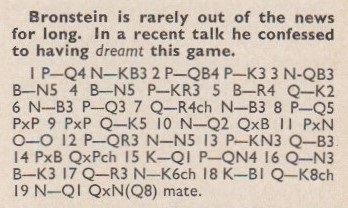
Page 220 of the May 1982 BCM published a 17-move game which Anthony Saidy reported having composed in his sleep the previous year. Also in the ‘Quotes & Queries’ column in the BCM, see: November 1984, pages 506-507; February 1993, page 95; July 1994, page 386; November 1994, page 613.
A ‘dream position’ against Zukertort was given by Alfred J. Watson in a letter on page 235 of the Chess Monthly, April 1884. It included an analytical remark by the Editor which the latter corrected on page 288 of the May 1884 issue.
A light article on chess and sleep by Anthony E. Santasiere was published on page 77 of Chess Digest, April 1973.
Below are some comments in an article by Capablanca published on pages 459-462 of the English Review, November 1922:
‘It so happens, now, that while there are several experts who remember every serious game I have played in the last 22 years, I can hardly remember a single one of them. A game played today I may hazily keep in my head for a few weeks, but after that it is gone forever. No doubt my present poor memory is a cultivated one. I have been influenced to adopt this system in order to avoid loss of sleep after a hard struggle at night. Thus I can go to sleep right after a game, whether I win or lose, and one hour after a long, strenuous, simultaneous séance against any number of opponents I may be found peacefully sleeping in my bed.’
From an interview with Steinitz in the Pittsburgh Dispatch, quoted on pages 197-198 of The Steinitz Papers by K. Landsberger (Jefferson, 2002), concerning his 1892 match with Chigorin:
‘At that time I was suffering terribly from insomnia, and so was my opponent. Night after night I lay with scarcely any sleep and in a fever. But my physician advised me that it would be detrimental even then to get sleep by artificial means. Sometimes, indeed, men have accomplished some of their most brilliant play while in this excited condition. Let me give you an example. When the present match [the 1894 contest against Lasker] began in New York, one night I had only three hours’ sleep, and another night none at all; yet in the second game, which I won, I achieved some of the finest results, while one night preceding a game, which I lost by a blunder, I had slept nine hours. I felt much better the day following the sleepless nights than I did after nine hours’ slumber, when the reaction was too great to be overcome.’
An item on page 286 of CHESS, August 1959 under the heading ‘Chess and Insomnia’:
‘In studies at Cambridge of the consequences of loss of sleep, three of the ten tests adopted have been games: chess, darts and table tennis. We should have thought darts the best of these, chess being too complex to furnish a safe basis for deductions.
After 60 hours without sleep, it was found, people could still perform interesting tasks quite well but were bad at anything boring. Chess was presumably classed as interesting – but the ability to withstand boredom can be a useful weapon in a chess player’s armoury.
All congress players know the importance of being able to play well after a sleepless night. Perhaps the Cambridge tests give us a new tip: keep the game interesting (exciting?) at all costs.’

Avital Pilpel (Haifa, Israel) notes Tim Krabbé’s account of a dream about Kramnik (item 336) and his article ‘Dream Combination’.
To the Chess Notes main page.
To the Archives for other feature articles.
Copyright: Edward Winter. All rights reserved.